Gaza journalist: I had to leave husband behind to save our children
Amal Helles reported for The Times on life under bombardment. She reveals the horrors she saw and her agonising decision to escape.
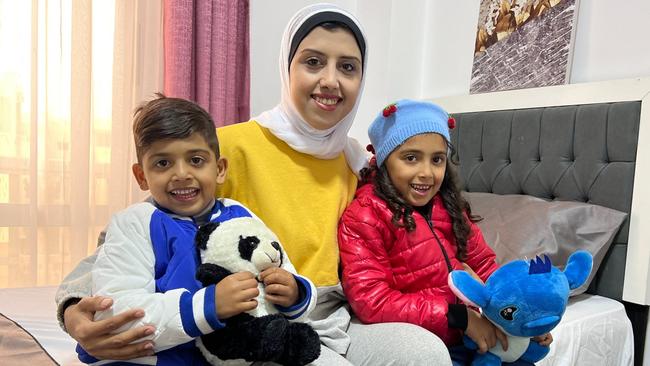
“I hated the night most. We would lie in the darkness, my husband and I, my beautiful young daughter and son warm between us, so if the bombs came, we could all die together,” Amal Helles explains, as she thinks back on the last few months. “I felt grateful every morning that we had survived but we were so tired of homelessness and helplessness; tired of surviving death.”
Helles has been reporting on the conflict in Gaza for The Times. “I am a Gazan citizen, a Palestinian and, most importantly, the mother of Maryam and Wajj, aged six and four,” she tells me on a Zoom call. “My husband, Samed, is also a journalist, which makes me constantly afraid and anxious as he is always outside running towards the explosions.”
Helles has finally escaped to Cairo with her children but she has had to leave her husband behind with his sick mother and “abandon” her brothers, sisters and parents. “Of course, I feel terrible guilt,” she says as her daughter clutches at her sleeve. “We have become fine, finally, but I may never see them again.”
Before the conflict started Helles, now 29, and Samed, 31, lived in Khan Younis in southern Gaza, and felt blessed. “We could move easily between places, communication was good, the oranges tasted sweet. I worked for five years as a journalist writing about ordinary things and I was woken by the sound of birdsong. Now we live in the worst days because we have many family and friends who have become part of this awful conflict, we can’t communicate with them, we never know whether they are still alive.”
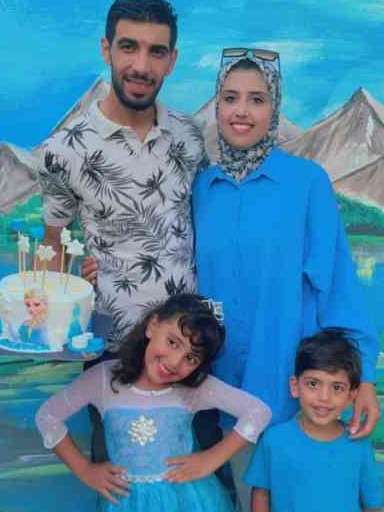
Their life only six months ago was boringly normal, she stresses. “On Fridays and Saturdays we would go hiking and to Kids Land, an amusement park, my children’s favourite place. It is no longer there, destroyed. We would go for lunch or dinner at restaurants, they are all now damaged. We went to their grandmother’s, that has gone too. They had eggs and milk for breakfast from the supermarket. In this conflict they lived on rusks, there were no fridges because there was no electricity, the shops were all closed or obliterated,” she explains, still trying to comprehend the jarring juxtaposition.
“It was a good, comfortable and calm life. But for nearly five months now the fear has smothered our faces, our lives, the anxiety, the worry, the constant displacement. My children always asked me, “Mama, are we in the safe zone? I didn’t know.”
Helles can clearly remember the day last October when it all started. “I was dressing Maryam to go to school. She is in the first grade, it was her first term, and she was very excited and happy. Suddenly we saw the planes in the sky and heard these explosions. We didn’t know what they were. But we had heard the reports of what had happened in Israel. We were afraid; we didn’t know what the reaction would be from the Israeli side. The children ran to me, and I hugged them and told them there was nothing dangerous to be scared of, it would all be over soon. Even then I knew I was a liar. That’s all I have kept saying for months and nothing has ended.”
At first, the family determined to stay and protect their home but soon the sound of shelling and shaking buildings began to drive them demented; the dust and debris choked their lungs when they opened a window. Then the leaflets started to fall, telling them to evacuate. “I cried a lot; I couldn’t bear to leave forcibly. But my children had nowhere to wash, no portable water, no food, no electricity, no wifi. We relied on canned food but I had no appetite. My son worried how the cats and birds would eat.”
Her daughter became sick from the smells of the smoke as everyone began to burn furniture to cook. “It affected her chest badly. They got flu, colds, coughs. They had little resilience, their faces were pale. I kept the children inside, but I couldn’t bear to see them suffering. I had always had big dreams for them to have the finest food, the best education. Maryam only had a month of school; she missed her new friends. There is no education now in Gaza. I once wanted them to go to university. Now I couldn’t even supply their simple requests, like fruit and vegetables.”
The family took very little when they fled. “My children’s birth certificates, marriage certificates, a little medicine, a change of clothes for the children, but I thought I would return. My daughter took her Barbie doll, Wajj took his Spider-Man outfit. He pleaded to take all his toys. I told him we would one day return but our neighbours told us three days later it was damaged.” They desperately needed to find a car. “Finally, someone said they would take us.” They joined the dishevelled, displaced diaspora, staggering towards Rafah, on donkeys, bicycle and foot. “I became very focused on protecting the children and shielding them from seeing the ruins and rubble round us.”
The constant life-or-death decisions were agonising and exhausting. “There was only room for me and the children, so Samed sent me first, and brought his family later. It made me very nervous to be separated. It was a dreadful day, we all cried a lot. But we couldn’t stay any longer, the planes circulating. The sound of ambulances and screaming. We couldn’t sleep for a moment. They were always asking: ‘Will we die?’ I was always repeating: ‘Don’t be afraid’, but I didn’t feel it.”
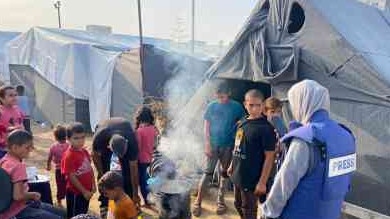
Yet whenever possible, Helles and her husband would put on their flak jackets and go to work as journalists. “I wanted to chronicle what was happening. But the children were terrified at home alone, I had to tell them to stay strong and promised to leave early and bring back some biscuits or bananas. But I was paralysed in front of their simplest requests. There were no biscuits left, no salt even. The markets were all empty and I knew I may not even return home at night.”
As a journalist, Helles saw the devastation on the streets and followed the ambulances to hospital. “We heard awful stories and saw things I want to forget: a man digging through rubble to get his mother’s body out; children wandering around dazed and alone, sadness in their eyes, the only survivors, they had lost all their family. I kept thinking what will happen to my children if we die. I couldn’t bear to think of their pain at losing us.”
There was almost no medication in the hospitals, she explains. “People were lying on the floor moaning with injuries. The streets were filled with sewage and long lines of people queueing for water or standing around outside empty bakeries.”
In Rafah, they sought safety in a house with 20 other displaced families. “We were 17 in our group and we lived in two small rooms and a bathroom.” During the day her relatives distracted the children with colouring pens and paper, and singing. For three days they only had one bottle of water and began to drink from puddles.
There were soon a million displaced people in Rafah. “People were scrabbling to find blankets and string for tents. We needed to protect the children from the cold, the winter, the bombing. We didn’t let them on the street, it was too dangerous in the open.” But the houses could all too easily become tombs, she explains.
“A house next to us was bombed at 11pm while we slept and we heard a massive explosion, dust, stones, glass whirled around us. We thought we had been hit; it was fragments of missile that hit the door. I had the children in my lap, hugging them. We couldn’t see anything in the dark, we thought we might die as the walls rocked. The house stayed upright but it was the worst night.”
Yet the next day she still went out to report. “As a journalist, I had to see what was happening. I saw children torn apart, with no limbs, parents holding them in their arms, trying to stop ambulances, others trying to collect body parts.” Often, she could not even send her copy. “It was like living 100 years ago. There were constant blackouts, little contact with the outside world. Friends outside Gaza tried to check on me but I couldn’t communicate with them for weeks.” Catherine Philp, the Times diplomatic editor, would be frantically calling, staring at the single grey tick on Helles’s WhatsApp.
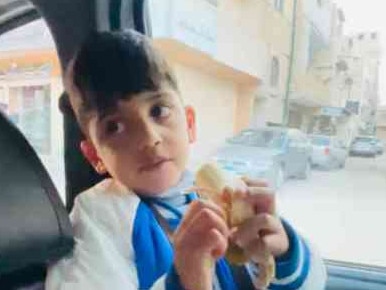
In the end Helles felt she had to concentrate on her children. “My husband and I managed to convince them we could protect them. I can’t say they were patient. But they had no life. I would say we will go outside Gaza one day; we will make another life, have a shower, eat some pizza, and return when you are a little older.”
When Helles was given the chance to leave for Egypt with them, she agonised with her husband, but he convinced her to go. “My children had never travelled. They had never been without their father, but he decided he had to stay behind with his mother, who was by now really sick. My feelings were very mixed. I had to preserve my children’s lives; my husband felt he had to stay.”
She felt tortured making the decision. “I could stay and cover the situation and be with my sisters and parents but I also knew I was a mother first. I have never done anything without my husband. It was one of the most difficult days of my life. I only hope he will follow us one day before Gaza is annihilated.”
The journey across the border took hours. “We were pushed through on the Palestinian side but on the Egyptian side we were kept in the hall for five hours. Finally, we were met by someone from the British embassy who made it as smooth as possible.”
For now, they are staying in a complex in Cairo and her children wander in and out of the room, peering excitedly at the fridge and politely interrupting to ask for cake. “Maryam keeps whispering to me: ‘Are we in a safe zone?’ I explain we are in another country. Wajj saw someone selling bananas coming here and we had to stop the car. It is his favourite fruit and it’s been more than five months. When we passed a diesel station, Wajj asked: ‘How do you have diesel, where did it come from?’ They couldn’t believe water was coming out of a tap and they could switch on a light. I have promised them we can watch movies and make popcorn.”
As a reporter, Helles doesn’t want to comment on the conflict, insisting she needs to remain impartial, but she can’t tear herself away from the news. “Rafah recently had another horrific night; I am fearful every time that I get a message that a member of my family or friend has died. I have just sent my husband my love, I must do it regularly in case it is the last time. I can’t send him money, there is no banking system now. People are running out of cash. I dread what happens then. I think there will be starvation soon. My children lost a lot of weight, so did I.”
She will not comment on the Israeli government or criticise other countries for their policies. “I don’t want to cause more friction. I just want peace. We need it, we need a ceasefire. It does make a difference when people like Prince William speak up. Gaza’s children require safety and to be able to dream again.” Does she fear her children may have been radicalised and will never forgive or forget these past few months? “When they saw the life here in Egypt and families walking along the streets, all relaxed, they just wanted to live again and forget but it will take time. I am not sure we will forgive.”
Her children are giggling cautiously as they wander around their new sitting room. “They are still traumatised and worried about their grandparents and father. When I slammed the door by mistake today, they were terrified, they thought the conflict had come to Egypt. They are jumpy and have nightmares. I think they will recover but they are too familiar now with the words ‘ceasefire’, ‘bombs’ and ‘missiles’.”And what about her, how is she coping? “I couldn’t sleep the first nights here in Cairo, I thought I was back home. But yesterday I slept comfortably for the first time in months.”
And what does she already miss most? Helles sighs. “I miss sleeping in my own bed, in my home, on my pillow, I miss my room, I miss my house. We built our dream house together, it took us a year, it was a huge effort. I miss it all. I miss my mother, I haven’t seen her for a month, I couldn’t say goodbye to her. I love her so much; I hope one day I will see her after the conflict ends, and my father and my brothers and sisters.” She is crying softly now.
“I always dreamt for my children to live not this life, not this pain, not this suffering, I miss taking them for a walk in our old street, I miss our days without bombing, without fear. I miss our life before the conflict, I miss going to the beauty salon, I miss my clothes. I miss my husband.”
But for the first time in months, she can think about the future. “One day we will have to ask what will happen to Gaza, will it be rebuilt? There are no homes, just displaced people and orphans. I don’t think we can return to what it was before all this. There are no jobs, no universities, no schools, no streets now. The life of Gazans are lost of everything. I fear we can never be happy, cheerful or normal again.”
The Times

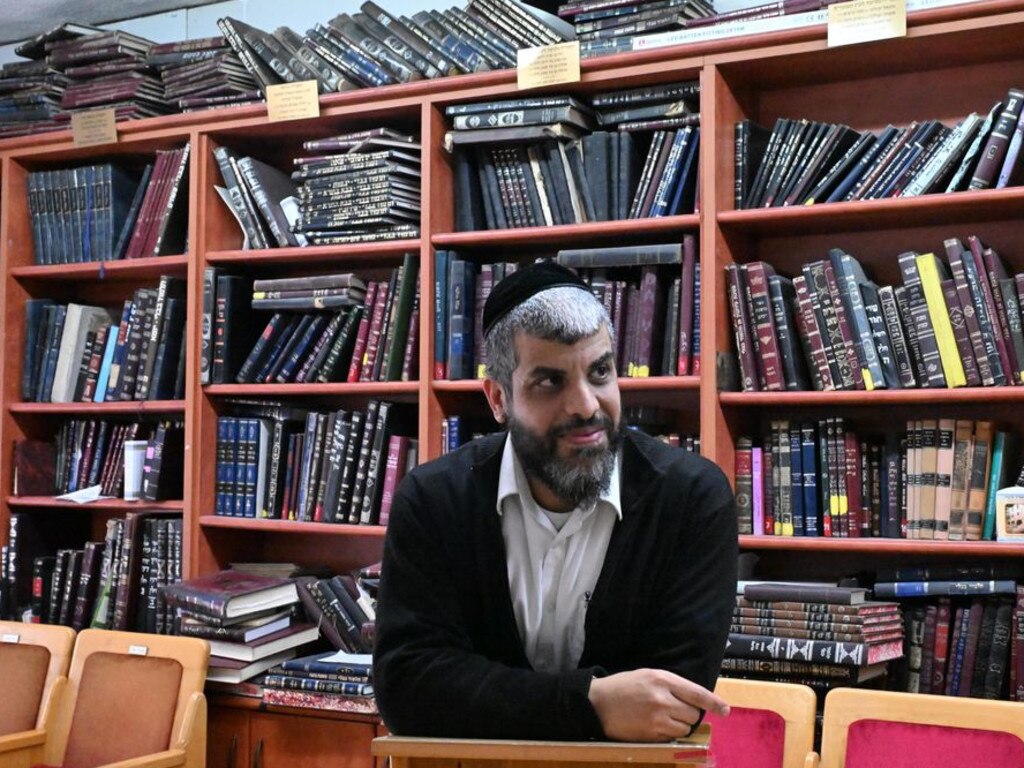

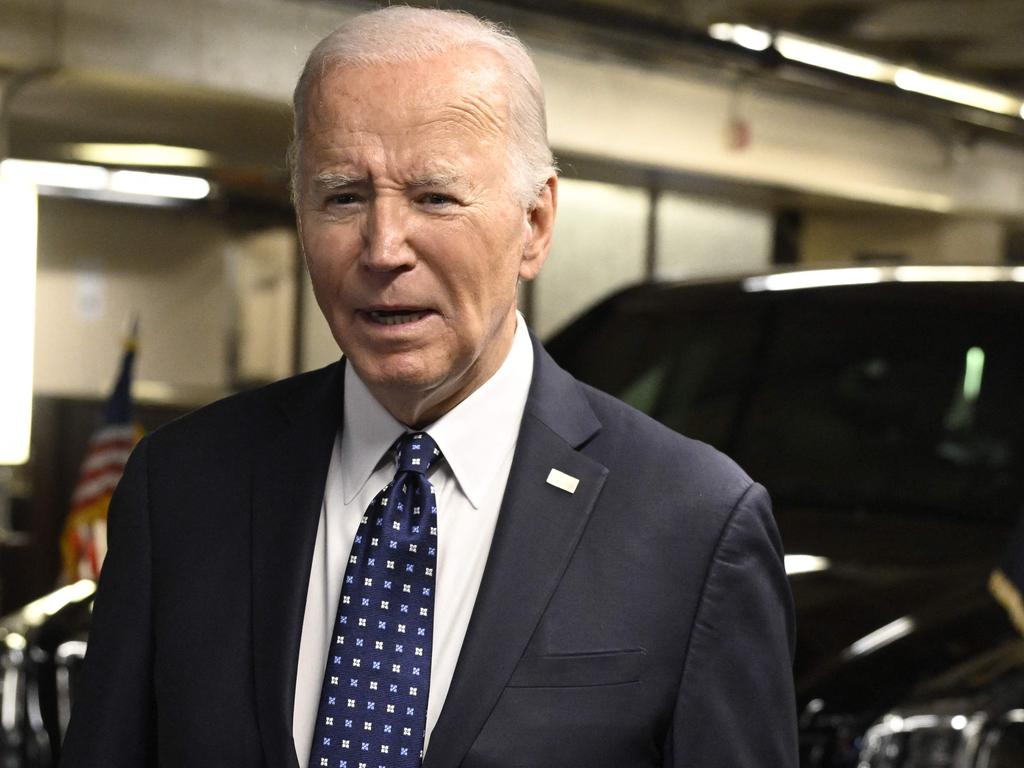
To join the conversation, please log in. Don't have an account? Register
Join the conversation, you are commenting as Logout